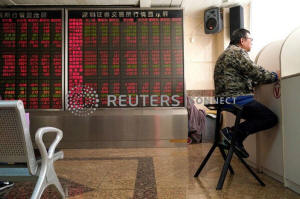Global stocks stumble toward best week since June
 Send a link to a friend
Send a link to a friend
 [February 07, 2020]
By Marc Jones [February 07, 2020]
By Marc Jones
LONDON (Reuters) - Nagging coronavirus
worries took a swipe at world markets on Friday, though that wasn’t
going to stand in the way of the best week for stocks since June and the
strongest for the dollar since August.
Europe's trading day began with stocks down and safe-haven government
bonds up, a pattern that had been set in Asia where the death toll from
the virus in China has more than doubled in less than a week.
It stood at 638 on Friday, 636 in China and two elsewhere and it was
also revealed that one of the first doctors to raise the alarm about the
virus had died from it at a hospital in Wuhan, the outbreak's epicenter.
The week up until this point, though, has been one long rebound that has
lifted MSCI's main world stocks index 3 percent <.MIWD00000PUS> and
almost back to the record highs it began the year with.
Thanks to a $400 billion wipeout on Monday, Shanghai is poised for its
worst week in eight months. But the other Asian indexes are ahead and
the pan-European FTSEurofirst is heading for its best week since late
2016.

"We are not that nervous, actually we are increasing our risk
allocation," said SEB investment management's global head of asset
allocation Hans Peterson, adding the risk of a massive worldwide
epidemic seemed to have dropped.
"We look more at this moment at the macro data in the U.S. which is
really very good... and we presume we will get substantial support from
central banks like we did in China on Monday."
There were other areas of focus aside from the virus worries for
traders.
The euro fell to its lowest since October in early European trading
after German industrial output recorded its biggest decline in a decade
and strong U.S. employment numbers on Thursday had primed the dollar for
monthly payrolls later.
In Asian trade, the yen halted a slide that has it set for its worst
week in 18 months, leaving the currency sitting just above a two-week
low at 109.89 per dollar.
The Australian dollar, often seen as a proxy for China, weakened 0.5% to
$0.6699 <AUD=D3> after the Reserve Bank of Australia slashed growth
forecasts in its quarterly economic outlook, blaming its bushfires and
the coronavirus.
[to top of second column]
|

An investor sits next to a stock quotation board at a brokerage
office in Beijing, China January 3, 2020. REUTERS/Jason Lee

The Aussie was still on track for its first weekly gain this year,
whereas Singapore dollar <SGD=> and Thai baht <THB=> have been
trampled in a rush from emerging market currencies into majors.
OIL TOILS
Much is unknown about the coronavirus, including its lethality and
transmission routes. The World Health Organization has said it is
too early to call a peak in the outbreak.
China's aggressive response, dubbed a "people's war for epidemic
prevention" by President Xi, has seen Beijing pump billions of
dollars into the money market to try and stabilize confidence.
Yet, owing to much greater exposure to Chinese demand and less
access to the benefits of monetary stimulus, commodity prices have
been more sensitive to conditions on the ground.
Oil and metal prices fell hard as the coronavirus outbreak gained
pace and have been slow to recover.
Brent crude <LCOc1> was a touch firmer on Friday at $55.17 per
barrel, but is heading for its fifth back-to-back weekly drop having
lost over 16% this year.
A rally in copper - often seen as a barometer of global economic
health because of its wide industrial use - stalled at $5,695 per
tonne though it has been its strongest week since the start of
December.
"We think that demand could come back strongly as opposed to
gradually in Q2 2020," said Commonwealth Bank commodities analyst
Vivek Dhar. "But the risk in the near term is that (Chinese)
provinces take longer to return to work in order to contain the
spread of the virus."

(Additional reporting by Tom Westbrook in Singapore; Editing by Toby
Chopra)
[© 2020 Thomson Reuters. All rights
reserved.] Copyright 2020 Reuters. All rights reserved. This material may not be published,
broadcast, rewritten or redistributed.
Thompson Reuters is solely responsible for this content. |